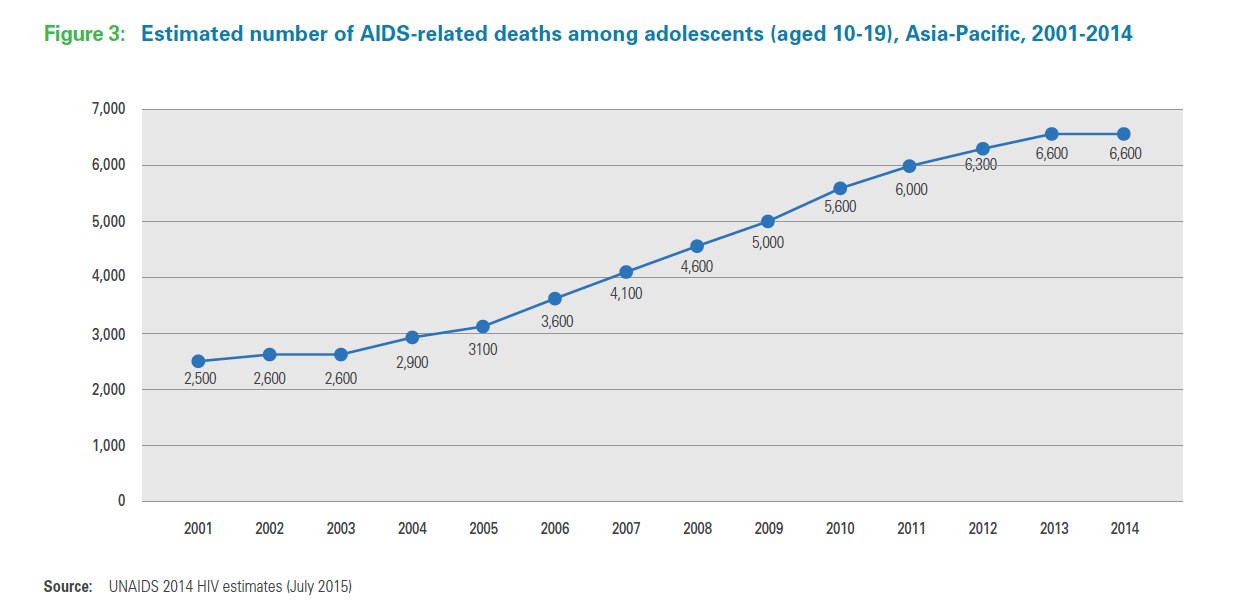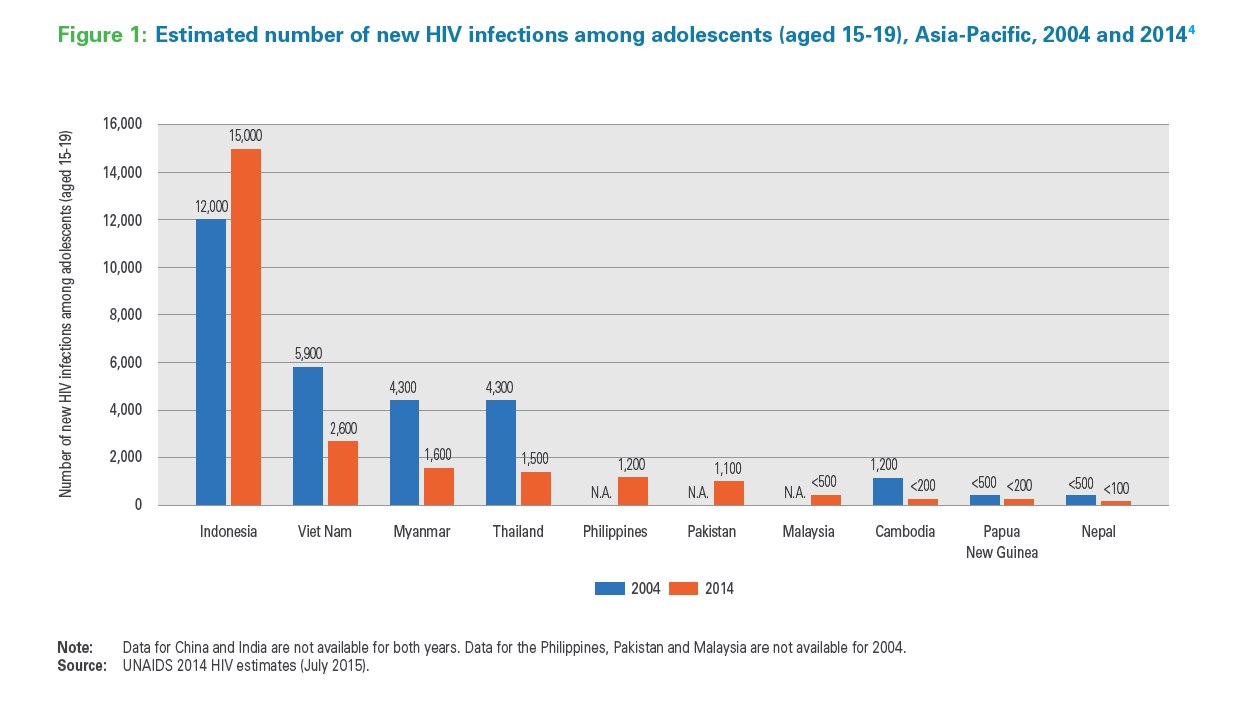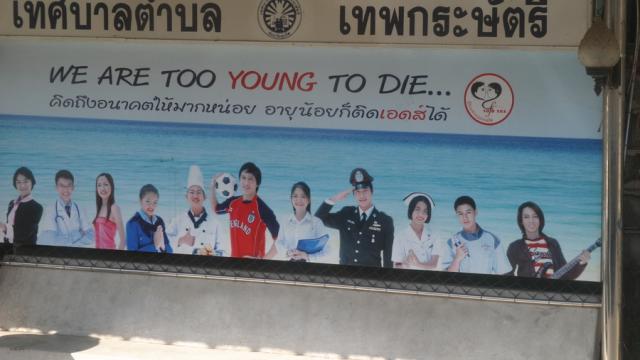We’re making progress in the fight against HIV around the world, but it’s still very unevenly distributed. And the United Nations’ brand new report on HIV infections among teenagers in Asia is pretty upsetting. Some 50,000 Asian teens (aged 15-19) became HIV-positive in 2014 alone, and a total of 220,000 adolescents were living with HIV in the region.
AIDS-related deaths of teenagers in Asia increased a horrifying 110 per cent from 2005 to 2014, while deaths of adults actually went down 28 per cent. Deaths of teenagers from AIDS nearly quadrupled in South Asia, from 1500 in 2001 to 5300 in 2014.

The news gets worse the more you drill down. It’s not just that HIV prevention efforts have failed to slow down rates of HIV infections among teenagers in Asia — it’s that these kids generally fall through the cracks, on HIV education but also on testing and treatment. Kids who get HIV are less likely to know about their status, and also less likely to receive treatment, than adults. The report says that fewer than a third of HIV-positive teens in the region are likely to receive antiretroviral (ARV) treatment, much lower than the proportion of adults.
Some of this gap in prevention and treatment comes from major blind spots, because local authorities aren’t aware they should be addressing teenagers with their HIV prevention messages. Or they actually have policies that make the problem worse — such as requiring parental consent for HIV tests under the age of 18. Imagine having to tell your parents about your sex life before you can get an HIV test.
But a lot of the problem also stems from abuse and stigma. LGBT teenagers in many Asian countries are more likely to be victims of discrimination and abuse than adults, and also fall into sex work and drug use in alarming numbers. The UN report, titled “Adolescents Under the Radar,” includes first-person accounts by teenagers who were mistreated by their families and wound up on the streets, as well as kids who received no meaningful HIV education until they turned 18. A lot of teenagers haven’t gotten enough sex education to realise they need an HIV test, and they’re also afraid of being stigmatised and bullied if they test positive. A third of HIV-positive teens in China report being bullied, or even barred from going to school.
One especially awful statistic: 48 per cent of sex workers aged 18-24 in Mumbai tested positive for HIV. “The younger the age of women selling sex, the less they tend to know about HIV,” says the UN report.

The good news? The rate of new HIV infections among teens aged 15-19 fell sharply around the world between 2000 and 2014, mostly because the number of new cases in Eastern and Southern Africa dropped by almost half. But the rate of decline of new cases among teens in Asia has only dropped slightly — and in some places, like the Philippines and Indonesia, it’s actually gone up in recent years. A few urban areas appear to be “hotspots” of HIV infection, including Hanoi, Jakarta, Bangkok, Chiang Mai and Mumbai. In Bangkok, the rate of new infections among people aged 15-21 was double the rate for all age groups.
The UN report speculates that the”explosion of smart phone gay dating apps” like Grindr has led to increased risk-taking among these young people. They’re starting to have sex at a younger age, having more partners, and using condoms less often, because it’s so easy to find an immediate sex partner using an app.
Wing-Sie Cheng, the Unicef HIV/AIDS adviser for East Asia, tells the Guardian that these dating apps “essentially hook you up to a central network” of sex partners, and it’s easy for infection to spread throughout that network. So she warns that “with the rise of these apps,the probability and risk of infection will increase multifold,” adding: “This is the new frontier of AIDS to tackle right now. The world can never end AIDS if this issue is not controlled.”
But the UN report also gives plenty of other reasons why the global effort to fight HIV has failed to reduce the number of new infections among Asian teens. There are harrowing tales of discrimination against gay and trans teenagers in schools, as well as battles against loneliness and depression. There are stories in this report that will turn your stomach, including one young transgender sex worker in Dhaka who was raped three times before she turned 12, and only survived because she found a community of others like herself.
The UN has set new global targets in reducing HIV infections among these vulnerable teenagers. They aim to reduce new HIV infections by at least75 per cent from 2010 to 2020, and reduce AIDS-related deaths by at least 65 per cent. This plan is called “All In”, and it includes more interventions to provide condoms, lube, testing and counselling to teenagers — along with getting rid of legal barriers to testing, treatment and other services. And also gathering more information — because a lot of the data we have now isn’t specific to teenagers, but is targeted either at young children, or all people under 25.
But a lot depends on whether local governments commit to these goals, and to the steps the UN recommends. In 18 countries in the region, sex between men is still a criminal act, and in other countries the age of consent for homosexual sex is higher than for hetero sex. And in Malaysia, transgender women can face a “double whammy”: prosecution for being transgender and for having allegedly “same sex” encounters with men. Most countries in the region also criminalise sex work, and the police tend to confiscate condoms as “evidence”.
You can read the whole United Nations report here.
Top image: AIDS awareness poster in Thailand, via side guacamole/Flickr.
